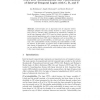Free Online Productivity Tools
i2Speak
i2Symbol
i2OCR
iTex2Img
iWeb2Print
iWeb2Shot
i2Type
iPdf2Split
iPdf2Merge
i2Bopomofo
i2Arabic
i2Style
i2Image
i2PDF
iLatex2Rtf
Sci2ools
CSL
2008
Springer
2008
Springer
Non-finite Axiomatizability and Undecidability of Interval Temporal Logics with C, D, and T
Interval logics are an important area of computer science. Although attention has been mainly focused on unary operators, an early work by Venema (1991) introduced an expressively complete interval logic language called CDT, based on binary operators, which has many potential applications and a strong theoretical interest. Many very natural questions about CDT and its fragments, such as (non-)finite axiomatizability and (un-)decidability, are still open (as a matter of fact, only a few undecidability results, including the undecidability of CDT, are known). In this paper, we answer most of these questions, showing that almost all fragments of CDT, containing at least one binary operator, are neither finitely axiomatizable with standard rules nor decidable. A few cases remain open.
| Added | 19 Oct 2010 |
| Updated | 19 Oct 2010 |
| Type | Conference |
| Year | 2008 |
| Where | CSL |
| Authors | Ian Hodkinson, Angelo Montanari, Guido Sciavicco |
Comments (0)

